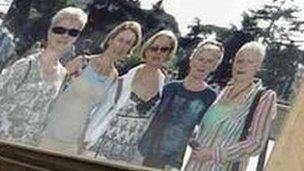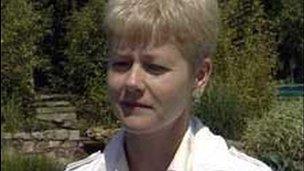BRCA1: Hopes for women at high risk of breast and ovarian cancer
- Published
Dr Kienan Savage says drugs could potentially reduce oestrogen levels and prevent cancer
Women at high risk of breast and ovarian cancer may soon be able to avoid the stark choice of preventative surgery after a research breakthrough.
For women carrying the mutated BRCA1 gene, opting to have breasts and ovaries removed has been the only way of reducing the cancer risk.
Belfast researchers have found a link between high hormone levels and BRCA1 carriers' ability to fight cancer.
Currently around one in 1,000 women in the UK have the BRCA1 mutation.
It exposes them to a 85% risk of breast cancer and 45% risk of ovarian cancer.
As it is hereditary, the mutated gene can devastate families with generations of women at risk of developing breast and ovarian cancer.
The only alternative has been preventative surgery, such as a mastectomy (removal of the breast) and oophorectomy (removal of the ovaries).
It can be a difficult choice for young, healthy women, some of whom are still at child-bearing age.
High-profile carriers of the mutated BRCA1 gene, who opted for double mastectomies, include the Hollywood actresses Angelina Jolie and Christina Applegate, external.
But now researchers at Queen's University, Belfast, have said they have come up with a possible alternative.

Angelina Jolie is a high-profile BRCA1 gene carrier who last year opted for a double mastectomy
The research, conducted at QUB's Centre for Cancer Research and Cell Biology (CCRCB) is said to prove there is a direct link between high levels of oestrogen and DNA damage, which causes cancer in the breasts and ovaries.
The scientists discovered that the cells of women with the BRCA1 mutation cannot effectively fight the very high levels of oestrogen that exist in all women's breasts and ovaries .
This leaves them vulnerable to DNA damage.
Alternative
Dr Kienan Savage, who led the research, said: "This discovery is very significant in the management of women with the BRCA1 gene mutation.
"It's the first really credible evidence that oestrogen is driving cancer in women with a BRCA1 gene mutation.
"Because of this discovery, we now have the opportunity to propose an alternative treatment to surgery. It also opens up the possibility of pausing treatment for a period in order for women to have children, if desired."
The research, which has been ongoing for four years, was funded by Cancer Focus NI and Cancer Research UK.
The next stage will be clinical trials which could start within a year.
For one Northern Ireland family in particular, the outcome of the trials could be very significant.

Five sisters from the Conlon family chose to have double mastectomies
Several members of the extended Conlon family, who are originally from County Armagh, are carriers of the BRCA1 mutation.
Five of the Conlon sisters chose to have double mastectomies, external, rather than face the risk of developing or redeveloping cancer.
'Strong family history'
One of the sisters, Caroline McErlane, had elective surgery in 2008.
"We became aware of the BRCA1 gene in 2007/2008 when the second of my sisters was suffering from breast cancer," Mrs McErlane said.
"They were beginning to establish quite a strong family history and Bronagh was recommended to test for the BRCA1 gene. Unfortunately her test came back positive."
Caroline McErlane is one of seven Conlon siblings - five sisters and two brothers.
One by one they took the test and discovered that all five women and one of the men were carrying the BRCA1 gene. The women opted for surgery.
"We all agreed that without a doubt, with the decisions available to us then, this was the safest route forward for all of us," Mrs McErlane said.
However, she believes the QUB breakthrough may bring "huge" benefits for the younger members of her family.
"It's very, very positive. At this stage myself and my brothers and sisters have taken our decisions, but we all have children and among us there are eight girls who potentially could test positive.
"So our focus is very much on the next generation, not only of our own family but the BRCA1 family at large.

Caroline McErlane was a fitness fanatic in her 40s when her breasts and ovaries were removed
"A number of our cousins also have tested positive, so it's a bigger picture," Mrs McErlane added.
'Nagging question'
She said that alternative treatment to the surgical removal of breasts and ovaries would give the younger members of the Conlon family choices that her own generation did not have.
"Our timing of our diagnosis was when we (already) had our children, their's won't be. They can decide when they are 18 to test, and one of my nieces has tested and is positive."
She said her niece was now facing the "nagging question - when will this rear up and bite me?"
"So, I think it's very very exciting that they have choices," Mrs McErlane said.
The chief executive of Cancer Focus Northern Ireland, Roisin Foster, said: "This has been the potential in the foreseeable future to benefit women all over the world.
"We are only able to support this vital work because of the generosity of the local community."
- Published14 May 2013

- Published12 March 2014

- Published14 May 2013
